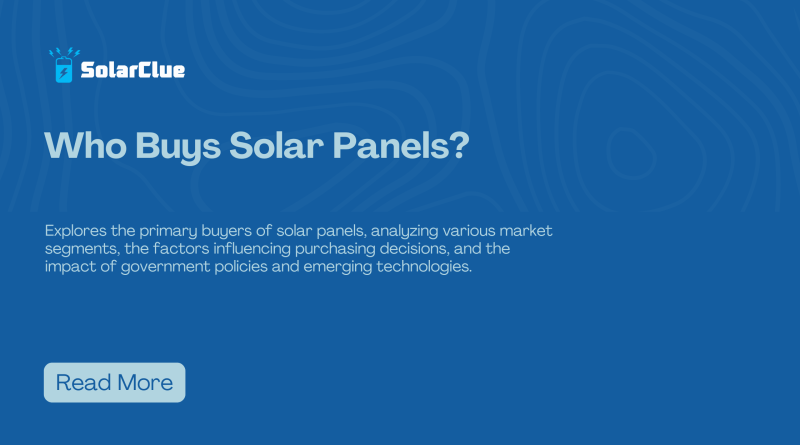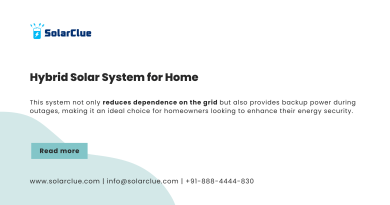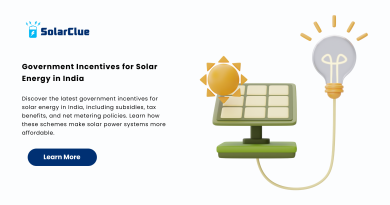Who Buys Solar Panels?
The solar panel market is diverse, encompassing a wide range of buyers from different sectors. This blog explores the primary buyers of solar panels, analyzing various market segments, the factors influencing purchasing decisions, and the impact of government policies and emerging technologies.
Table of Contents
- 1 Residential Solar Panel Market: Homeowners, Renters, and Cooperatives
Residential Solar Panel Market: Homeowners, Renters, and Cooperatives
Homeowners:The residential market is driven by homeowners looking to reduce their electricity bills and environmental footprint. Factors influencing their decisions include upfront costs, potential savings, available incentives, and the payback period.
Renters and Cooperatives: Renters and housing cooperatives are also entering the market through community solar projects, where multiple individuals share the benefits of a single solar installation. These arrangements are often facilitated by leasing and financing options, making solar energy more accessible.
Commercial Solar Panel Market: Businesses, Offices, and Retail Establishments
Businesses: Commercial entities, such as offices and retail establishments, invest in solar panels to lower operational costs, enhance sustainability credentials, and achieve energy independence. The decision-making process involves assessing long-term savings, return on investment (ROI), and corporate social responsibility goals.
Offices and Retail Establishments: These buyers often look for solutions that can be integrated seamlessly with existing structures and operations, focusing on minimizing disruption and maximizing financial benefits.
Industrial Solar Panel Market: Manufacturing, Agriculture, and Mining
Manufacturing: Industrial buyers, including manufacturing plants, seek solar energy to reduce high energy costs and stabilize energy supply. Factors such as energy consumption patterns, space availability for installations, and potential disruptions are critical in their decision-making process.
Agriculture and Mining: In the agriculture and mining sectors, solar panels provide a reliable power source in remote locations, reducing dependence on diesel generators and enhancing operational efficiency.
Utility-Scale Solar Power Plants: Power Companies and Investors
Power Companies: Utility-scale solar power plants are major players in the solar market. Power companies invest in large solar farms to diversify energy portfolios, comply with renewable energy mandates, and meet growing electricity demand.
Investors:Investors, including private equity firms and institutional investors, view utility-scale solar projects as attractive long-term investments with stable returns. They consider factors such as project location, regulatory environment, and financial incentives.
Government and Institutional Buyers of Solar Panels
Government Entities: Governments at various levels (federal, state, and local) purchase solar panels to meet renewable energy targets, reduce public sector energy costs, and promote sustainability initiatives.
Institutions: Educational institutions, hospitals, and other public organizations invest in solar energy to cut costs, enhance sustainability, and serve as role models for the community.
Market Segments and Influencing Factors
| Market Segment | Primary Buyers | Key Factors Influencing Purchases |
|---|---|---|
| Residential | Homeowners, Renters, Cooperatives | Upfront costs, savings, incentives, payback period |
| Commercial | Businesses, Offices, Retail | Long-term savings, ROI, sustainability goals |
| Industrial | Manufacturing, Agriculture, Mining | Energy consumption, space availability, operational efficiency |
| Utility-Scale | Power Companies, Investors | Diversification, regulatory compliance, financial incentives |
| Government and Institutional | Government Entities, Institutions | Energy targets, cost reduction, sustainability initiatives |
| Emerging Markets | Transportation, Agriculture | Innovation, operational efficiency, environmental benefits |
The Role of Solar Panel Leasing and Financing Options
Leasing and financing options play a crucial role in making solar panels accessible to a broader audience. Power purchase agreements (PPAs), solar leases, and loans enable buyers to adopt solar energy with minimal upfront investment, spreading costs over time and enhancing affordability.
Emerging Markets for Solar Panels
Transportation: The transportation sector is increasingly adopting solar energy, with applications ranging from solar-powered electric vehicle (EV) charging stations to solar panels integrated into vehicles.
Agriculture: Beyond traditional uses, solar panels are being employed in innovative agricultural applications, such as powering irrigation systems and greenhouses.
The Impact of Consumer Preferences and Attitudes on Solar Panel Purchases
Consumer preferences and attitudes significantly influence the solar panel market. Growing environmental awareness, the desire for energy independence, and the appeal of cutting-edge technology drive demand. Marketing strategies and public perception play key roles in shaping consumer behavior.
Here at SolarClue®, we offer a smart, practical, and “beautiful” solution. You will be answered for all the questions related to Solar.
We provide all kinds of brands that are the Best Solar panels in India.
If you are the one who is planning for the solar power system. Don’t hesitate to contact our team!
Looking forward to empowering you with solar energy, just like hundreds of our other clients!




